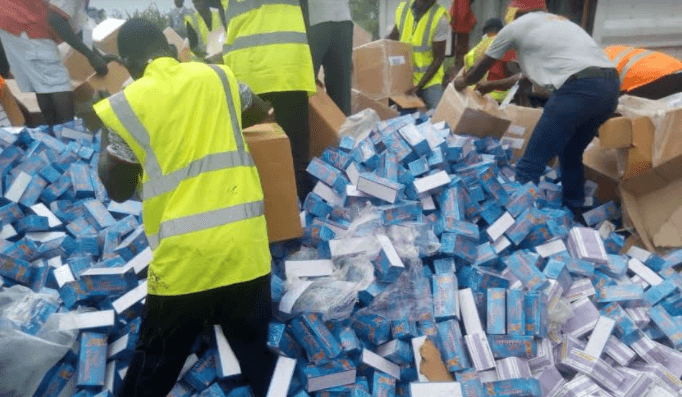The National Agency for Food and Drug Administration and Control (NAFDAC) has shut down over 11,000 drug shops in Aba, Onitsha, and Idumota markets. The agency also arrested 40 individuals linked to the sale of unregistered and dangerous pharmaceuticals.
During a press tour of NAFDAC’s warehouse in Apapa, Lagos, Director-General Prof. Mojisola Christianah Adeyeye revealed that the agency has confiscated and evacuated 77 truckloads of counterfeit and illicit drugs. Breaking down the seizures, she disclosed that 27 truckloads were from Idumota, 30 from Onitsha, and 20 from Aba.
Prof. Adeyeye described the shocking discoveries made during the operation, which has been ongoing for over three weeks. “We found vaccines that should have been refrigerated but were left at room temperature. We uncovered massive quantities of controlled substances and expired condoms that should have been destroyed since 2022. We even found medicines donated by USAID and free antiretrovirals being sold,” she said.
The crackdown exposed even more disturbing practices, including the illegal modification of drug expiration dates. “We discovered machines used to alter the expiry dates of drugs that originally expired in 2022 or 2023, fraudulently extending them to 2028. People taking these medicines are unknowingly putting their lives at risk,” she warned.
Among the dangerous drugs seized were Tramadol 225mg, a highly potent opioid linked to severe neurological damage, and Tapfradol, a dangerous combination of tapentadol and carisoprodol that has been banned in India. NAFDAC also uncovered drugs stored in unsanitary conditions, including toilets and unventilated warehouses without windows, making them even more hazardous to consumers.
Read Also: Obi urges NAFDAC to re-evaluate closure of Onitsha market
Prof. Adeyeye emphasized that these actions are not aimed at disrupting businesses but at protecting lives. “We are not against trade; we are safeguarding the health of Nigerians. We are making sure that if you have hypertension, your medication actually helps you recover rather than making your condition worse.”
Despite the agency’s efforts, NAFDAC faces major challenges, including inadequate manpower and funding. “Our staff members are handling the workload of five people because we lack sufficient personnel,” she lamented, urging the federal government to provide additional support.
She also issued a stern warning to Nigerians about buying medicine from street vendors. “If you purchased medicine from a roadside stall, throw it away immediately. Only buy from reputable pharmacies to ensure your safety,” she advised, highlighting the role of parents in preventing drug abuse among youths.
NAFDAC is far from done. The agency plans to extend its enforcement operations to more states, working closely with security agencies to eradicate fake drugs from Nigeria. Prof. Adeyeye called for stricter border control to prevent smugglers from flooding the market with dangerous pharmaceuticals. “Our porous borders make our work harder. We need more security personnel to stop the entry of substandard drugs.” Adeyeye added.






